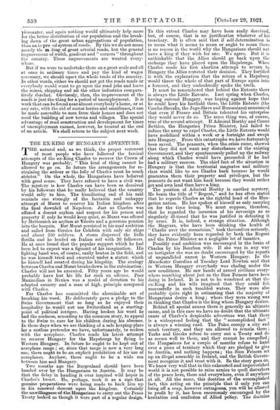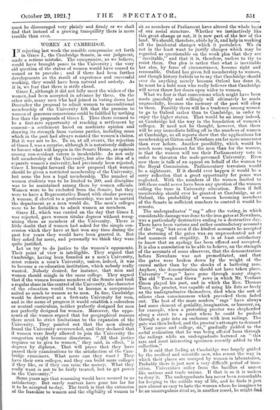THE EX-RING OF HUNGARY'S ADVENTURE. T HE natural and, as we
think, the proper comment of most people who have followed the farcical attempts of the. ex-King Charles to recover the Crown of Hungary was probably, " This kind of thing cannot be allowed to go on. In future the arrangements for re- straining the ardour or the folly of Charles must be much stricter." On the whole, the Hungarians have behaved with good sense. They have refused to have a civil war. The mystery is how Charles can have been so deceived by his followers that be really believed that the country would rally to him. The humiliating end of his raid reminds one strongly of the fantastic and unhappy attempt of Murat to recover his Italian kingdom after the final downfall of Napoleon. Just as Charles was offered a decent asylum and respect for his person and property if only he would keep quiet, so Murat was offered by Metternich an asylum at Trieste and a generous pension into the bargain. But Murat persisted in his mad ambition and sailed from Corsica for Calabria with only six ships and about 250 soldiers. A storm dispersed the little flotilla and he landed on Italian soil with 30 followers. He at once found that the popular support which he had been led to expect was a figment of his imagination. His fighting band was, of course, easily beaten in the field, and he was himself tried and executed under a statute which he himself had created during his kingship. The analogy between Charles and Murat breaks down in the culmination ; Charles will not be executed. Fifty years ago he would probably have lost his life for such an offence. Poor Maximilian in Mexico was a model of devotion to his adopted country and a man of high. principle compared with Charles.
For Charles has committed the abominable act of breaking his word.. He deliberately gave a pledge to the Swiss Government that so long as he enjoyed their hospitality he would not use Switzerland as a starting- point of political intrigue. Having broken his word he had the coolness, according to the common story, to appeal to the Swiss to care for his children during his absence. Xn these days when ive are thinking of a safe keeping-place for a restless pretender we have, unfortunately, to reckon with the aeroplane. Charles made his latest attempt to recover Hungary for the Hapsburgs by flying to Western Hungary. In future he ought to be kept out of aeroplane range ; or, since that range is now a very long one, there ought to be an explicit prohibition of his use of aeroplanes. Anyhow, there ought to be a wide sea between him and Hungary. Two months ago the Burgenland should have been handed over by the Hungarians to Austria. It may be that the delay in handing it over inspired wild hopes in Charles's breast. He, perhaps, took it as a sign that genuine preparations were being made to back him up in his renewed descent upon the kingdom. Certainly the unwillingness of the Hungarians to carry oat the Peace Treaty looked as though it were part of a regular design. To this extent Charles may have been really deceived, but, of course, that is no justification whatever of his treachery. It is often said that if self-determination is to mean what it seems to mean or ought to mean there is no reason in the world why the Hungarians should not have a king if they wish for one. We agree. But it is unthinkable that the Allies should go back upon the embargo they have placed upon the Hapsburgs. When Charles made his first abortive attempt to return to Hungary the Allies restated their decision. They fortified it with the explanation that the return of aliapsbure would throw the whole of that part of Europe again into a ferment, and they undoubtedly spoke the truth.
It must be remembered that behind the Entente them is always the Little Entente. Last spring when Charles, having entered Hungary, was hoping against hope that he .could keep his foothold there, the Little Entente (the Czecho-Slovaks, the Jugo-Slays and Rumanians) announced that even if France and Britain tolerated his enterprise they would never do so. The same thing was, of course, true of the second. attempt. If Admiral Horthy and Count Bethlen, the Hungarian Prime Minister, had failed to induce the army to expel Charles, the Little Entente would have mobilized within a week or a fortnight and swept into Hungary. From this catastrophe we have fortunately been saved. The peasants, when the crisis came, showed that they did not want any disturbance of the existing Government, and they spontaneously pulled up the railway along which Charles would have proceeded if he had had a military success. The chief fact of the situation in Hungary is that the territorial magnates and military class would like to see Charles back because he would guarantee them their property and privileges, but the peasants do not want him back because they would rather get and own land than have a king. The position of Admiral Horthy is another mystery. He bears the title of " Regent," and he has often stated that he regards Charles as the rightful head of the Hun- garian nation. He has spoken of himself as only carrying on for the time being. We must suppose, therefore, that he regarded the incursion of his sovereign as so singularly ill-timed that ho was justified in defeating it by arms. It is, indeed, a strange situation. Although the Magyars, who have been drinking the health of " Charlie over the mountains," took themselves seriously, they have evidently been regarded by both the Regent and the Prime Minister as a negligible lot of fanatics. Possibly mad ambition was encouraged in the brain of Charles by his Bourbon wife. If she was in any way an instigator she was no doubt encouraged by the reports of unparalleled unrest in Western Hungary. In the Manchester Guardian of Tuesday Lord Newton said that in Western Hungary everybody was chafing under the new conditions. He saw bands of armed civilians every- where marching about just as the. Sinn Feiners have been doing in Ireland.. It is not to be wondered at that the ex-King and his wife imagined that they could fish successfully in such troubled waters. They were also probably quite right in estimating that the majority of Hungarians desire a king ; where they were wrong was in thinking that Charles is the king whom Hungary desires. Behind all special causes there is generally an ultimate cause, and in this case we have no doubt that the ultimate cause of Charles's despicable adventure was that there is a widespread feeling that the " accomplished fact " is always a winning card. The Poles occupy a city and much territory, and they are allowed to remain there ; Turks and Greeks refuse to carry out a Treaty and do aa seems well to them, and they cannot be compelled ; the Hungarians for a couple of months refuse to hand over a piece of territory which they are pledged to give to Austria, and nothing happens;. the Sinn Feiners set up an illegal assembly in Ireland, and the British Govern- ment recognize it and treat with it. So the story goes on. We know very well that in this exhausted and impoverished world it is not possible to raise armies to quell disturbers of the peace here, there and everywhere, even if anywhere at all. All the same, this doctrine of the accomplished fact, this acting on the principle that if only you can bring off a coup, however outrageous, you will be allowed to profit by it, has been enormously encouraged by the hesitation and confusion of Allied. policy. The doctrine must be discouraged very plainly and firmly or we shall find that instead. of a growing tranquillity there is more trouble than ever.







































 Previous page
Previous page